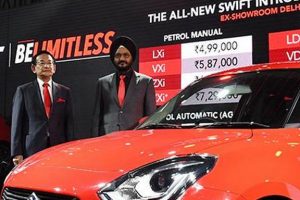‘Govts. must help cut car buying cost to lift sales’

Maruti flags high tax rates, input costs
Expressing concern over a steady decline in the growth rate for car sales in the last decade, Maruti Suzuki chairman R.C. Bhargava said the industry was unlikely to witness reasonable growth rates unless the central and State governments work towards reducing the initial acquisition costs of cars.
“The slowing in the demand for cars is largely because the cost of acquisition by consumers has increased due to various reasons like regulatory changes, depreciation of the rupee, increase in cost of raw materials and taxes imposed by State governments,” he said in the company’s annual report.
Mr. Bhargava added that the Goods and Services Tax (GST) on cars, based on past rates of excise duty, was much higher than the GST (or equivalent) in all other major countries of the world.
On the future outlook, he said while in March 2021, the company was quite optimistic about the outlook for FY22, the suddenness and ferocity of the second wave of the pandemic was a surprise to all, and led to lockdowns and restrictions in most parts of the country.
The performance in the next three quarters, he said, would depend largely on how effectively citizens follow the government’s directions on vaccination and observe safety protocols. “If we can avert the third wave, or substantially reduce its effect, and there are no further waves, economic activities and sales of cars can improve significantly over what was achieved last year,” he said.
He said Maruti Suzuki expected to be able to work smoothly and without disruptions as more than 90% of its employees and their families will have been vaccinated by the end of August.
Talking about R&D, Mr. Bhargava said to achieve the goal of ensuring more and more people being able to afford a car, Maruti Suzuki used technology. “Suzuki Japan is giving priority to the development of technologies suitable for the Indian market. Research and development efforts are being accelerated and your company would be fully involved in this work,” he said, adding that Suzuki’s alliance with Toyota in Japan would prove very valuable for this effort.
Further, talking about green technologies, he said, “No doubt that the large resources that are now being deployed for technology development will lead to lowering the cost of EVs and reducing dependence on lithium, procurement of which poses some strategic issues of national importance.”
The time frame for all of this to happen was not certain but meanwhile there was a need to reduce import of oil and harmful emissions, he said, adding that in India, the use of CNG, particularly for small cars, had proved highly acceptable to customers.
“Your company will also seek to improve the technology for CNG cars. Hybrid technology also leads to a significant reduction in fuel consumption and emissions and is another area for our engineers to work. Thus, these two technologies, coupled with biofuels, gives the country a means of moving towards the final goal of net-zero emission. The use of hydrogen is also an interesting alternative and should be considered specially to reduce dependence on importing lithium,” he said.
Mr. Bhargava also noted that the cash reserves of the company had been of ‘great help’ in dealing with COVID-19 related problems and ensuring that its people did not suffer. “We will use these reserves to establish new production facilities as soon as a few problems are resolved,” he said.
In the report, the company’s MD and CEO Kenichi Ayukawa added that the challenges in FY21 were not only limited to human safety and business continuity, but also extended to delay in new model development and significant cost pressures led by unprecedented increase in the prices of commodities throughout the year. Besides, foreign exchange movement remained adverse during the year. Given uncertainty around the sustenance of demand, the company had undertake a ‘cautious approach’ in raising the prices of cars, he said.
The pandemic is still continuing, and the possibility of future COVID-19 waves could not be ruled out, Mr. Ayukawa said, adding that car manufacturing was both capital and labour-intensive with a long value chain. “Any disruption in operations because of lockdowns will create severe cash-flow concerns and may pose a threat to the survival of some of the value chain partners. In such uncertain circumstances, the company finds it prudent to conserve cash to provide the supplier and dealer partners with cash-flow support if the need arises,” he said.
Mr. Ayukawa added that the rapidly changing regulatory and technological landscape was further adding to the uncertainty, which makes maintaining cash reserves a more prudent choice.
On electrification of the powertrain, he said Suzuki Motor Corporation, in a joint venture with Toshiba Corporation and Denso Corporation, was setting-up India’s first lithium-ion battery manufacturing plant with cell-level localisation. The manufacturing facility is ‘almost ready’ to be operationalised and will be announced soon.
Source: Read Full Article
